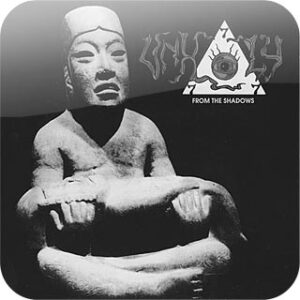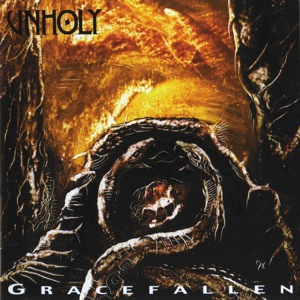Doom, like so many genre tags is the loosest of possible definitions and the bands that are grouped under the banner of doom cover the broadest church imaginable. For every gothic-tinged doom album that cloaks its unimaginably heavy guitar in velvet (My Dying Bride, Anathema, Paradise Lost) there is, at the opposite end of the spectrum, a band sitting only just to the left of none-more-raw black metal, tearing out relentless, remorselessly slow riffs with all the glacial atmosphere of a Burzum composition (Thergothon, The Puritan, Electric Wizzard) and it is at the latter end of the spectrum that we find Unholy upon their debut release, reissued here by Peaceville along with the band’s fourth and final release which saw the band refine their nihilistic savagery to a stunningly beautiful, and yet soul-destroyingly sorrowful point.
Certainly the early phase of Unholy is harsh. If you are looking for the grimly pleasant atmosphere of Doom’s more commercial acts then you need to explore the later album for ‘From the shadows’ is closer in spirit to the first black Sabbath album with subtle hints of psychedelia via Jefferson Airplane and the crushingly downbeat atmosphere of Burzum and My Dying bride’s via ‘turn loose the swans’. There is nothing pleasant here; no sun-dappled moment to alleviate the mood; just vicious, sludgy doom ground out with a fierce intent and blazing sense of commitment.
Of these two reissues, both of which are part of Peaceville’s on-going attempt to singlehandedly release or re-release pretty much every black/death and doom metal classic in existence the first we are going to look at is ‘From the shadows’, the band’s 1993 full-length debut and a fair representation of Black Sabbath, as covered by Obituary on Ketamine. Opening with the almost unbearably oppressive ‘Alone’ there is no gentle easing in or orchestral interlude, the band preferring to hit you square between the eyes with a dose of virulent doom metal so potent it is liable to singe the hair from your eyebrows. Slow, funereal and utterly devoid of the positive side of the human spirit, ‘Alone’ is possibly one of the best musical representations of the feeling its title relates to, and the track is shot through with a bleak sense of anguish which is hardly helped by the gentle, acoustic passage that contrasts beautifully with the distorted guitars but which does nothing to raise the pall of gloom that the song brings down. Lengthy, complex and irresistible to anyone with a penchant for bleakness ‘alone’ is a stunning introduction into the world of Unholy helped by the fact that the following track, ‘Gray blow’ opens with the sound of a massive, gothic organ with all the stops pulled out before giving way to a downbeat, psychedelic, track of limitless potency and featuring the vocal talents of Tanja Wehsely who provides the track with a suitable sense of deep foreboding and tension set against some of the gloomiest music ever laid down on record. ‘Creative lunacy’ is, arguably, exactly that with an off-kilter, only-vaguely-in-tune melody played at roughly half the speed one might expect with bass and drums providing a vital backbone to the bizarre guitar riffs and scorched-earth vocals.
Of all the tracks that are represented here ‘Autumn’ seems the most familiar, recalling the dark, black-metal laced doom of Paradise Lost’s iconic ‘Gothic’ album, complete with a disturbingly dry guitar sound and vocals wrenched from the inner-depths of torment. ‘Stench of ishtar’, meanwhile, is a distressingly slow trawl through the recesses of the psyche guaranteed to leave you utterly devoid of hope. ‘Colossal vision’ is a moody trip that is actually less colossal than you might imagine but it still has a powerful central riff that hints once more at early Paradise Lost but with a greater element of bass-led misanthropy in place. ‘Time has gone’ is a lengthy, keyboard-augmented epic with multiple sections linked, as ever, by the chainsaw buzz of the guitar. Possibly the darkest, most disturbing trip is ‘the trip was infra green’, a massive, arty beast that lacks any sort of traditional coherence but which contains a stark, corrosive atmosphere that is all its own and which forms a quite unique end point to the album with the lengthy coda of ‘Passe Tiermes’ almost a relief in its wake.
Overall, then, the first album is a harsh, obnoxious and thoroughly harrowing walk upon the dark side and it will appeal most to those who find anything post ‘gothic’ in Paradise lost’s back catalogue too cheery for their liking. Monumental, savage and unrefined it stands as a mighty debut but the band were destined for greater things…
Some six years later the band, with a slightly altered line-up featuring a different guitarist and drummer, released the infinitely refined ‘Gracefallen’ which simply serves to highlight the development the band made over the all-too-brief period they were active. Where there first album was as raw, vital and unpleasant as spitting in someone’s face, ‘Gracefallen’ is still brutally heavy and downtrodden, yet there is a newfound sense of melody and subtlety that complements the band’s original bleak vision without compromising their integrity. A similar advance could be seen between the abrasive hell of the Swans’ ‘filth’ and ‘the great annihilator’ albums and the opening track to ‘Gracefallen’, with its melodic, yet still biting, sound fades up gently rather than clawing your face off in the way that ‘alone’ does. It seems that in the space between the two albums the band learned that space and unnerving quiet passages can be just as effective as pummelling the listener with guitars set to overwhelming levels and ‘…of tragedy’, while still maintaining the band’s unusual melodic structures and heavy guitars, is filled with light and shade and lengthy open passages that see the band produce a more expansive sonic template than on their first release. The result is a song that is quite beautiful in its sense of tragedy and a greater sense of diversity between the lengthy and harrowing tracks. ‘Immaculate’, the album’s second track, opens with a corrosive guitar riff that is as discordant and atonal as anything you could expect to find on the band’s debut yet the edges are filed back – still razor sharp mind – but less obviously lethal which, arguably, makes their ultimate impact far more successful. Bleak and despair-ridden, the deathly vocals are still very much present and the oddly circus-like keyboards add a gloriously unhinged element to the music that makes it all rather like watching a clown commit suicide during a circus performance, but then such avant-garde disparity was always Unholy’s strongest card and they play it to perfection on ‘Gracefallen’. ‘Daybreak’ is another mid-tempo gem that is initially as abrasive as hell but which is also shot through with elements that develop the sound. The female vocals work well once again, especially when contrasted against the black metal vocals in later passages and the guitars are brutally heavy without overpowering the whole thing.
Everything comes to an abrupt stop for the overwhelming might of ‘when truth turns its head’, a violent, shocking blast of old-school bleakness that recalls the first album in its stripped-down ruthlessness along with the tumbling fury of Isis via ‘Oceanic’, suggesting that Unholy provided something of a template for the genre that Isis would come to pioneer whilst still sticking closely to their doom roots. It is this avant-garde sensibility that makes Unholy’s demise all the more tragic and the importance of these reissues all the clearer, allowing the band to rightly gain the recognition they so richly deserve. ‘Wanderer’ is a rather statelier, epic piece that recalls a combination of latter-day Paradise Lost and The Gathering with its lethargic riff and mid-tempo gate. Still powerful and with a churning central riff that contrasts perfectly with the beautiful vocal line which is rich in atmosphere and harmonies, it’s a high point of a powerful album and a perfect introduction to the band for the uninitiated. Sticking to the atmospheric over the unpleasant, ‘Reek of the night’ has a tribal rhythm and sticks to the female vocals that worked so well on the previous track. The contrast between this monolithic work and the debut album is nowhere more clear than here on this mellow, melodic work that is both beautiful and dark at the same time. The bombastic approach of yore, whilst devastatingly effective, is replaced with a subtle menace and glorious ambience, richly augmented by keyboards and harmonies and listening to the two albums in tandem feels like witnessing evolution in progress as you see the band sprout from some malevolent, poisonous entity to a fully-fledged and thoughtful being as capable of reason as of violence, and more intent on exploring the beauty of desolation rather than employing violent methods to spread it further.
After such an elegant piece ‘haoma’ is an instrumental torrent of sound that veers almost into stoner territory with its reliance on a simple repetitive riff augmented by bursts of sound and quitter, subtle passages filled with creepy, Pink Floyd-esque feedback. A moody, introspective piece, powered along by Kuhanen’s percussive drumming, it recalls a heavy metal interpretation of Pink Floyd around ‘Saucerful of secrets’ (think 5Ive’s ‘Hemophiliac Dream’ EP and you’ll know what I mean) which makes the casual brutality of ‘Seeker’ all the more shocking when it lands like a high explosive round and knocks you sideways with all the power of Anathema during their ‘Serenades’ period. That only leaves ‘Athene Noctua’ to round out the album proper as a lengthy and brutal mood piece, all muttered vocals and grinding art-house riff drawing an elegant, beautiful, disturbing record to its grandiose close. A bonus track, ‘gone’ is also present and correct but after such a lengthy trip it adds little although it’s not unwelcome and doesn’t feel tacked on for the sake of it.
While ‘from the shadows’ is a more violent piece, ‘gracefallen’ is the better, more rounded album. Both are excellent, although it would have been nice to see liner notes added to the packages detailing the making of each album, and as with all the current crop of Peaceville reissues the artwork has received a gentle tweaking so as to be presented with maximum impact. Ultimately, this is yet another must-have pairing from Peaceville and doom fans will be as delighted by the harrowing atmosphere of the band’s first outing as they will by the eloquent beauty of their last. Presented, as ever, in super-jewel cases it would be grand if these editions had appeared on vinyl also but in the meantime here is a chance to discover two classics of the genre presented in a respectful and thoughtful way.





